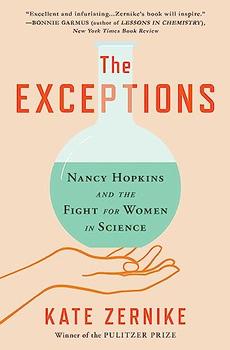Summary | Excerpt | Reading Guide | Reviews | Beyond the Book | Readalikes | Genres & Themes | Author Bio

Nancy Hopkins, MIT, and the Fight for Women in Science
by Kate ZernikeChapter 1
An Epiphany on Divinity Avenue
It was hard to deny the promise.
It was the second Tuesday in April 1963. Midmorning sunshine splashed the campus of Harvard University, where the trees were budding, and students were just back from a weeklong midsemester break. A Harvard man was in the White House, the youngest man ever elected president of the United States, heralding the dawn of a New Frontier. And here in Cambridge the next generation of ambitious young minds set out in crisp air along the tree-lined paths of the nation's oldest university, any of them on the way to do—it could be me—the next big thing.
At eleven o'clock, just north of the wrought-iron gates of Harvard Yard, and just east of the grounds where George Washington had once assumed control of the Continental Army, some 225 undergraduates, many in jackets and ties, filed down the gentle slope of a lecture hall to hear from a professor leading a revolution for the twentieth century. Five months earlier, James Dewey Watson had been in Stockholm with Francis Crick to collect a Nobel Prize for decoding, at age twenty-four, the structure of DNA, a discovery he called, immodestly but not incorrectly, "the secret of life." Watson and Crick's double helix had immediately placed them in the pantheon with Darwin and Mendel for explaining the development of life on earth and sounded a starting gun in the high-stakes race of modern genetics.
Now tenured at Harvard, Watson was about to begin his series of lectures in the introductory biology course for undergraduates. A tutor had written him that the students had done "rather well" on an hour-long test just before break: "They will return to Cambridge full of seasonal and customary liveliness and anticipating meeting you."
Nancy Doe, a junior, was already seated in the second row of the center section, almost directly in front of the lectern. She had arrived early, against her norm, and chosen her seat carefully. Not in the front row, because she didn't want her classmates to think she was a celebrity hound, and not in the back, where she usually hid, because she had read in the student evaluations that Watson dropped his voice at the end of his sentences, and she wanted to hear every word. Tall and slender, she had a sprite-like smile and wide blue eyes that took in everything but gave little clue to what she made of it. Her expression could shift from excited and girlish to wary and jaded in an adolescent minute. She nearly itched with intensity, considered her thick dark hair impossible to manage, her legs in their black wool tights absurdly long. Her mind tended to race, restless until it could alight on the biggest problem she could find, which at that moment was what she was going to do with her life. At nineteen, her future lay wide-open in front of her, but sitting in the wooden fold-down desk, she felt nothing as much as time closing in. Her father had died the previous year, and neither her wide circle of friends, the prerogatives of an Ivy League education, nor her tall, handsome boyfriend had insulated her from mounting dread.
Watson appeared suddenly, as if by a tailwind in a cartoon. Nancy sat up to look. This could not be him, she thought. He looked no more than thirty—in fact, he had turned thirty-five on Saturday, still young for a professor, much less a Nobel laureate. He was well over six feet tall but still gangly like a teenager, with enormous ears, a long bony nose, and round, protruding eyes. His hair was receding and barely tamed, a disobedient squiggle airborne over his forehead, like Tintin. He radiated impatient energy, his eyes everywhere at once—on his notes, on the students filling the room—looking through more than at. Watching, Nancy thought of him as a winged messenger, a wizard in a J. Press suit stopped in the middle of some monumental discovery to deliver the word to these lucky Harvard undergraduates.
Excerpted from The Exceptions by Kate Zernike. Copyright © 2023 by Kate Zernike. Excerpted by permission of Scribner. All rights reserved. No part of this excerpt may be reproduced or reprinted without permission in writing from the publisher.
Your guide toexceptional books
BookBrowse seeks out and recommends the best in contemporary fiction and nonfiction—books that not only engage and entertain but also deepen our understanding of ourselves and the world around us.